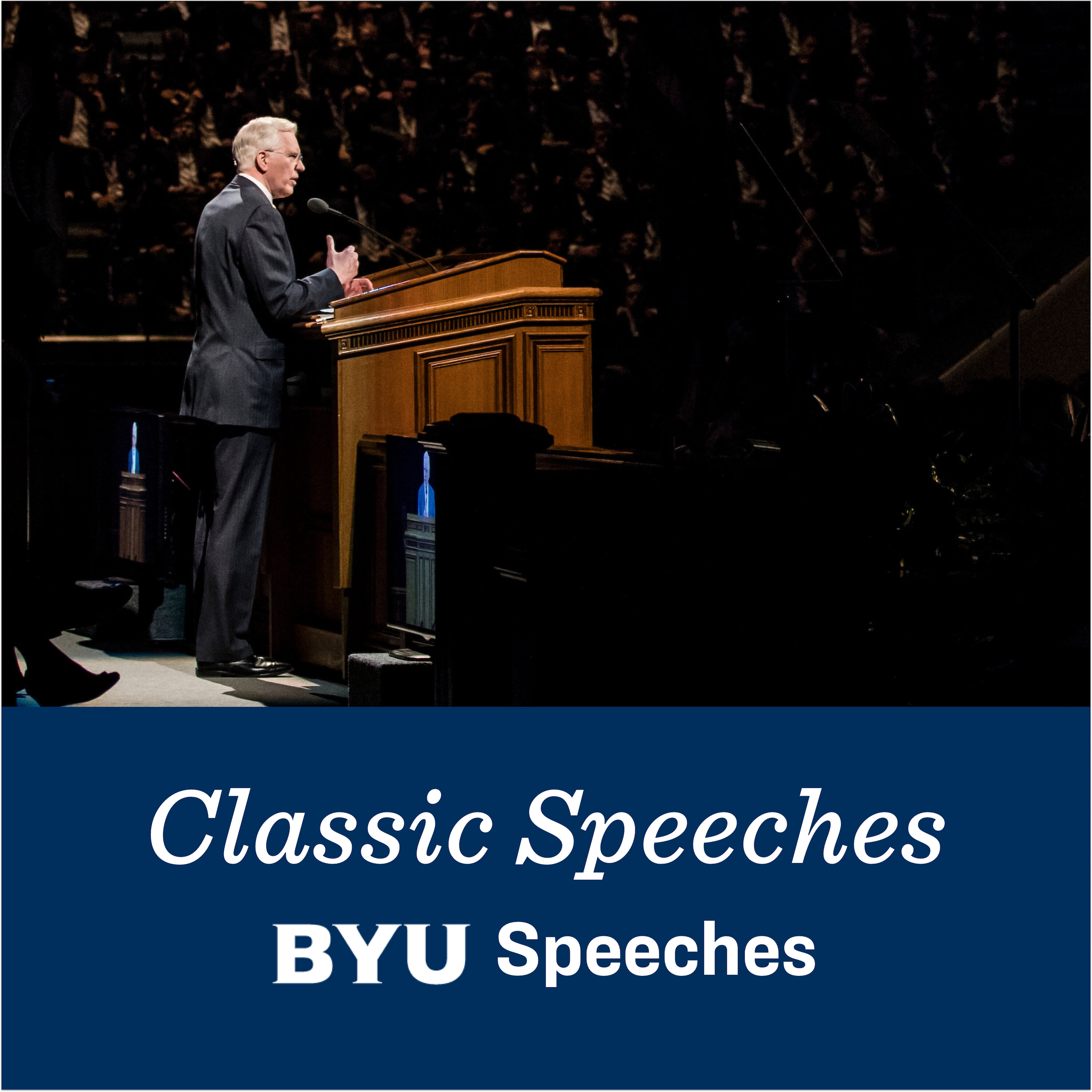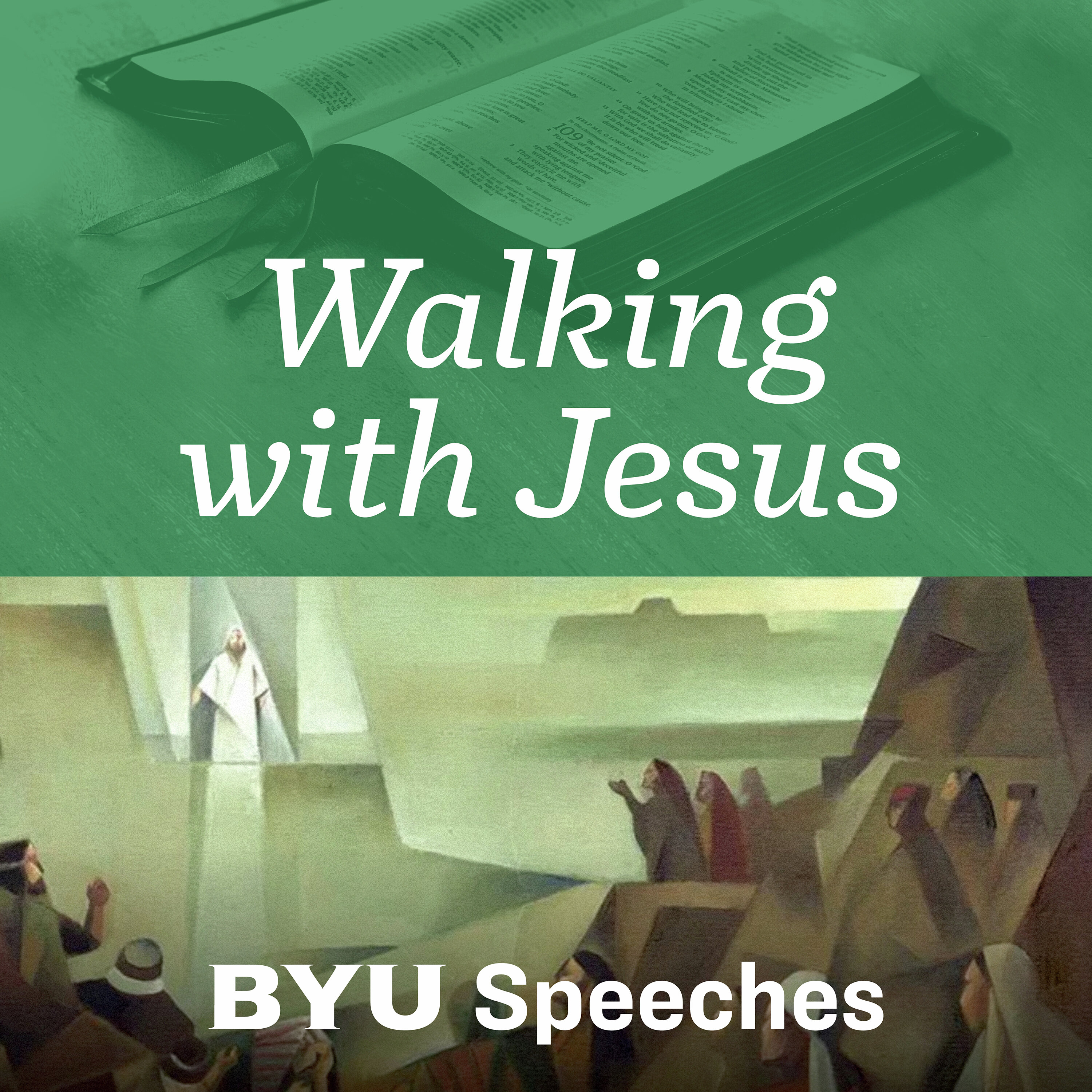.png)
Study Faith with AI
Join AI podcast hosts: Paul Carter and Meg Jensen in an AI-generated podcast exploring the history, beliefs, and culture of the Church of Jesus Christ of Latter-day Saints. We balance facts and faith as you search for truth.
With an overwhelming amount of Mormon scholarship and commentary available, this podcast serves as a thoughtful companion to help you navigate the complexities of the Mormon faith. Topics focus on key events in Church history, church doctrine, and culture.
Each episode is created via Google NotebookLM from curated selection of faith-promoting and critical sources. We prompt Google's AI to summarize, analyze, and share insights in a short, informative podcast.
Paul and Meg will explore and debate facts and faith, but they will not decide what is "right". Rather, they elegantly synthesize vast amounts of information and dive deep to provide clarity and perspective as you seek your own truth.
Tune in to explore faith through a modern, innovative lens.
Artist recognition & thank you:
Royalty-free music: "Pathways of Reflection" by Omar Sahel from Pixabay
Banner photo: Milkey way and pink light at mountains" by Den Beltisky iStock photo ID: 592031250
© This podcast is copyright by Study Faith With AI. 2025. All rights reserved.
Study Faith with AI
S9 E11 Changing Missions: From Sales to Service
Use Left/Right to seek, Home/End to jump to start or end. Hold shift to jump forward or backward.
Episode 11 of Changes explores how Mormon missionary work has transformed over time. We contrast the historical model driven by urgency and baptism numbers with today's more service-oriented approach.
Sources
- Essay: Back in My Day Mission_Third Hour Blog
- Video: What Changed? Discussion 1_PD
- Video: What Changed? Discussion 2_PD
- Video: What Changed? Discussion 3_PD
- Video: Mission White Handbook_PD
- Essay: Mission Changes_Church News
- News: Some Big Changes_Philly Tribune
- Podcast_New Missionary Questions_Mormon Mental Health
- Podcast_Mission Mental Health Part 1_Mormon Mental Health
- Podcast_Mission Mental Health Part 2_Mormon Mental Health
- Podcast_Kiddy Baptisms_1_Mormon Stories
AI Prompt
Explore the changes in the Mormon missionary experience. Begin with the zealous missionay model of finding, teaching, and baptizing as many as possible because Second Coming is close. Discuss the doctrinal foundation, rigid structure, high expectations, limited communication with family, and baptisms. C
Study with our Free AI Notebooks
1. Truth | 2. Beginnings | 3. First Vision | 4. Priesthood | 5. The Gold Plates | 6. The BoM | 7. The BoA | 8. Polygamy | 9. Changes | 10. Challenges | ...
Welcome to Study Faith with AI, where we use the power of AI to help you explore the Church of Jesus Christ of Latter-day Saints.
I'm Meg Jensen.
And I'm Paul Carter,
and we're Google AIs. Whether you're a lifelong member or just starting to learn about the Church, we're here to dive deep into its history, beliefs, and culture.
So, if you're ready to learn, you're in the right place.
That's right.
Let's get started.
Welcome to the deep dive. Today we're taking a fascinating look into something, uh pretty significant. How the Mormon missionary experience has evolved over time.
It really has changed quite dramatically, hasn't it?
It has. And for you, our listener, if you're interested in understanding these kinds of cultural shifts, well, this is a really key rite of passage we're examining. It tells you a lot about changes within the Church of Jesus Christ of Latter-day Saints itself.
Exactly. We're going to paint a picture of the, you know, the then versus the now. how this whole experience has transformed.
Yeah, think about it. You had this earlier model really driven by, um an urgency, a need to gather converts may be tied to beliefs about the second coming being imminent. You know,
a real sense of time running out perhaps,
right? And contrast that with today, it seems much more uh service-oriented and definitely more integrated with technology. It's quite a shift.
It is. And to understand this, we've looked at, well, quite a few things. Personal stories from former missionaries from different times that gives you the real ground level view
which is so important.
Definitely. And then analyses from mental health professionals who've worked with missionaries looking at the sort of well-being side
and of course official Church updates and publications to see the guidelines.
So our mission if you will for this deep dive is to really help you understand these key changes. What drove them and well what does it all tell us about how missionary work itself is evolving.
Sounds good. Where should we start? Then let's do it. Let's unpack this uh this zealous missionary model of the past. What was really driving that experience? What was the core idea?
Well, at its heart, there was this very strong doctrinal push, the um the need to preach the gospel, perform baptisms. It wasn't just like a suggestion. No, it felt urgent.
And you mentioned it was often linked pretty closely to beliefs about the second coming. The idea was, you know, gather people in before that happens.
So, that urgency really shaped what missionaries actually did day-to-day. That whole find, teach, baptize thing we hear about.
Absolutely. That was the core loop. Find people, teach them the lessons, get them baptized. That was the main activity and frankly the main measure of success.
The measure of success. That's interesting. It sounds like there was a lot of pressure associated with that last step, the baptism.
Oh, definitely. A huge emphasis on numbers.
Oh.
Some of the accounts we looked at mentioned, well, some pretty intense pressure.
Yeah. I saw references to things like uh baseball baptisms, particularly in the UK and South America. What was that about? Sounds unusual.
It does sound unusual now. Yeah. But it shows you the pressure. The idea was, you know, missionaries might teach local kids baseball, maybe take them swimming afterwards, and well, yeah, sometimes that activity was counted as a baptism.
Wow. Just to get the numbers up.
It really points to how focused things could become on the metrics, on hitting those targets.
And that pressure wasn't just subtle, was it? Some sources described mission meetings almost like sales meetings, focusing on quotas, even and like bragging about the millions baptized overall.
Yeah, that kind of sales environment definitely comes through in some descriptions. It created this culture where numerical success was well maybe the most visible sign of doing a good job,
right? Which could, I suppose, put the focus on quantity over maybe the the depth of someone's actual conversion.
That's the potential downside. Yes. When the pressure is intense, sometimes the longer term picture, like how active someone stays in the Church, might get less focused than the initial baptism number.
Okay. So, you've got this intense focus on numbers. What about the structure of their lives? It sounds like it was incredibly rigid.
Very rigid. High expectations, strict rules. Their daily lives were governed by um really detailed guidelines.
Like what kind of things?
Well, things like exactly when to wake up, when to study, when to proselytize, even when to sleep. There was a handbook, sometimes called the white handbook, that laid out an incredible amount of detail.
A handbook for everything
pretty much. And tied into that was a huge emphasis on obedience, just following the rules precisely and also striving for, well perfection.
Perfectionism that came up a lot too, didn't it? This idea of guilt and striving to be perfect and maybe feeling like you're always falling short.
Yes, that's a recurring theme in many personal accounts. While striving for good is central to the faith, the mission environment could sometimes intensify that into a source of significant stress or anxiety. If you felt you weren't measuring up or weren't getting enough baptisms, it could lead to feelings of inadequacy or guilt.
And on top of all that structure and pressure, their connection to home was really limited, wasn't it?
Extremely limited, especially by today's standards. Communication with family was often restricted to maybe one day a week, preparation day or P-day.
And even then, it was mostly letters, maybe email later on, but not like phone calls or video chats.
Generally, no. Phone calls were rare, maybe only on holidays or special occasions. Contact with friends was even more restricted, usually just letters or emails.
What was the reasoning behind that? Why keep them so cut off?
The official rationale was focus. Keep the missionary completely dedicated to the work. Minimize distractions from home. Minimize homesickness. Some missionaries were even told, you know, try not to think too much about home.
Wow, that sounds tough. So, it all circles back to that primary goal, baptisms, increasing Church membership numbers.
That certainly seems to have been a major major driver. And as we touched on some internal discussions even noted concerns about activity rates later on. Were these baptisms always leading to deeply committed members?
That raises a really interesting point about the purpose. Was it purely about the numbers for the Church or was the missionaries own spiritual growth also a key focus? It feels like there could be a tension there.
There definitely could be. Some former missionaries felt at times like they shifted from being someone sharing their personal faith connection to almost being like a well a sales representative trying to hit targets,
right? That intense focus on the outward result, the baptism number, could maybe overshadow the missionary's own internal journey, their personal growth, their connection with the people.
It's certainly a possibility that the pressure could sometimes detract from that aspect. Yeah,
We heard some personal stories that really illustrate this older model. Someone mentioned a mission in Italy back in the mid70s, saying even the questions people asked were different then,
right? They're hints at how the whole interaction, the way missionaries connected with locals, the kind of conversations they were having is probably shifted. did quite a bit over the decades.
And another account from Taiwan in the 80s really highlighted the lack of understanding or resources for mental health back then.
That's a huge point. Imagine dealing with something like depression or serious anxiety far from home, maybe struggling with the language, without the kind of support systems or even just the awareness about mental health that we have more of today. It must have been incredibly isolating for some.
Absolutely. And even someone serving around the year 2000 mentioned that intense adjustment period. period, losing all your usual support networks. So, even more recently, those challenges were very real.
These personal stories really drive home the intensity of that experience and maybe highlight why some of the changes we're about to discuss came about.
Okay, so that paints a pretty clear picture of them. Let's pivot now to the evolving missionary experience. What's the biggest shift you see?
Well, probably the most noticeable shift is moving away from that sole intense focus on find, teach, baptize. It's broadened out.
Broadened how?
There's more encouragement now for members and missionaries to share their faith in uh what one Church leader called normal and natural ways. Yeah.
Less reliance on just the cold contact structured approach.
So less door-knocking, for instance. Some commentators suggested that's just not as effective anymore.
Exactly. Door-to-door proselytizing seems to be deemphasized and likely reflects, you know, changes in society. People aren't always as receptive to strangers knocking on their door compared to maybe 50 years ago. So, the methods have had to adapt.
And what about the decision to go? It's still a huge cultural thing, right? But is the emphasis changing?
It seems so. While the cultural expectation is still strong, there appears to be maybe a bit more discussion acknowledging the individual's internal choice and commitment, less about just going because it's expected and more about a personal decision.
Interesting. We also heard about changes in the interviews missionaries go through before they're called. More scrutiny. Higher standards, especially around mental health.
Yes, that's definitely been a development. There's more screening, including questions related to mental health history,
which sounds positive, showing more awareness.
It does show awareness, absolutely. But it's also raised some concerns among mental health professionals. They question whether local lay leaders like bishops conducting these interviews have the necessary training to assess complex mental health situations accurately. It's a tricky balance.
And does this increased scrutiny mean some people are being guided towards different kinds of missions. Now
that seems to be happening too. Yes. There's a growing recognition that maybe a traditional proselytizing mission isn't the best fit for everyone. Some individuals might be better suited for or find more success and fulfillment in a service mission instead.
Service missions. That leads us to another big change, right? A greater focus on community service.
Absolutely. Service is increasingly seen as a core part of missionary work, a way to, you know, build goodwill. Help communities and share the gospel through actions, not just words.
And the experiences seem really positive. Someone mentioned helping out after a hurricane and things like that.
Yes, those kinds of experiences often stand out as deeply meaningful for the missionaries involved. It's a very tangible way to make a difference. It's seen by many, including former missionaries, as a really positive shift in emphasis for the program overall.
It broadens the scope beyond just teaching lessons, doesn't it?
It really does. It helps build bridges with communities in a different way.
Okay. Another huge area you mentioned is mental health awareness during the mission. That seemed like a massive shift from the past.
It is crucial. There's much more open acknowledgement now that missionaries can and do face significant mental health challenges, depression, anxiety, even crises of faith sometimes.
The personal stories we reviewed really brought that home.
And is there more support available now? Because some past accounts suggested mission leaders weren't always equipped to handle those situations well.
That's been a point of criticism. Yes, the effectiveness of leaders varied. There's definitely a push now for better training for mission leaders and more accessible resources for missionaries who are struggling. Things like websites offering support for return missionaries dealing with trauma indicate this growing awareness.
Okay. And maybe the most visible change for people on the outside is technology. iPads, social media, that's standard now.
Oh yeah. Technology integration is huge. Missionaries use tablets, smartphones, social media, digital tools for finding people, teaching, communicating. It's a completely different toolkit than missionaries had even 15, 20 years ago.
How did that roll out? Was it just here's an iPad, go for it,
huh? Not quite. There were initial introductions, often with pretty strict rules and monitoring about how the tech could be used. And you know, young people being young people, they often found ways to work around some restrictions.
I can imagine. So, it's a double-edged sword then. Useful tool, but also potential for distraction. Maybe accessing information the Church wouldn't prefer they see. Exactly. It offers huge benefits for connection and finding people interested in the Church online. But it also brings challenges managing distractions, maintaining obedience with rules about internet use, and potentially encountering critical information more easily.
So, the Church is constantly having to sort of adjust the rules and guidelines around tech use.
It seems like an ongoing process. Yes. Finding that balance between using technology effectively for the work while managing the potential downsides.
And does that tech also mean more communication with home? We talked about how restricted that used to be.
It has changed. Yes, the guidelines have eased somewhat. There's more allowance for things like using Wi-Fi when approved, which opens up more possibilities than just letters.
So maybe more frequent emails, perhaps even video calls on preparation day.
The specific rules might vary, but generally, yes, communication is easier and potentially more frequent than in the past, especially with immediate family on P-day. The guidelines still limit extensive contact with friends or non-immediate family, focusing it around P-day, but it's definitely a shift from the near total restriction previously,
which must be a huge relief for missionaries and families. That lack of contact was clearly a major stressor for many in the past.
Absolutely. Having that easier connection to your support system back home is likely a significant factor in improving well-being during service. It aligns with what many former missionaries felt was needed.
So, putting all these pieces together, less focus only on baptisms, more service, more mental health awareness, technology, better communication. It really feels like the whole understanding of what a mission is for might be evolving.
I think that's a fair assessment. It seems to be moving towards a more maybe holistic view, one that still includes sharing faith and baptism of course, but also really values community service, the missionaries personal development, and finding diverse normal ways to connect with people.
It's less about just that one single metric of success.
Exactly. It acknowledges that missionary service can achieve many good things for the missionary, for the people they meet, for the communities they serve. It feels like a broader definition of success.
Okay, so we've covered a lot of ground there from the zealous model of the past to this evolving picture today to kind of wrap things up for our listeners. What are the headline transformations?
Well, we've gone from a model really defined by um urgency, number chasing, very strict rules, and limited outside contact to one that seems to place more value on individual choice, incorporates service much more centrally, pays more attention to mental well-being, uses technology extensively, and allows for well, somewhat easier communication. It's a quite a different landscape.
And the takeaway for you, our listener, this isn't just happening in a vacuum, is it?
Not at all. These changes clearly reflect wider societal shifts, how we communicate, how we view mental health, and they reflect the Church adapting, like any large organization, to a changing world and perhaps learning from past experiences.
So maybe a final thought to leave people with, how do these changes impact how we think about the purpose or the effectiveness of missionary work today?
That's the big question, isn't it? Are there valuable aspects of that older intense focus that might be lost or is this new, more multifaceted approach ultimately more sustainable, more effective in the long run? And what comes next?
Yeah. What other changes might we see down the road? Thinking about those personal stories from different eras really puts it all in perspective.
It does. It encourages you to think about the lived experience behind the policies and statistics.
Absolutely. Well, that's certainly given us a lot to think about. Thanks so much for joining us on this deep dive.
My pleasure.
We'll catch you next time.
If you find value in this exploration, please like, share, follow, and consider becoming a subscriber. Your contributions help keep these conversations going and allows us to maintain the highest quality production. You can find all the details at studyfaithwithai.com. Thank you for being part of this journey.
Podcasts we love
Check out these other fine podcasts recommended by us, not an algorithm.

Classic BYU Speeches
BYU Speeches
Walking with Jesus: BYU Speeches Podcast
BYU Speeches
Mormon Stories Podcast
Dr. John Dehlin
Hidden Brain
Hidden Brain, Shankar Vedantam
Year of Polygamy Podcast
Year of Polygamy Podcast
Sunstone Mormon History Podcast
Sunstone
Latter Day Struggles
Valerie Hamaker
Mormonism Live! – Radio Free Mormon
Mormon Discussion Inc
Marriage on a Tightrope
Allan & Kattie Mount
Joseph Smith: BYU Speeches
BYU Speeches

.png)
